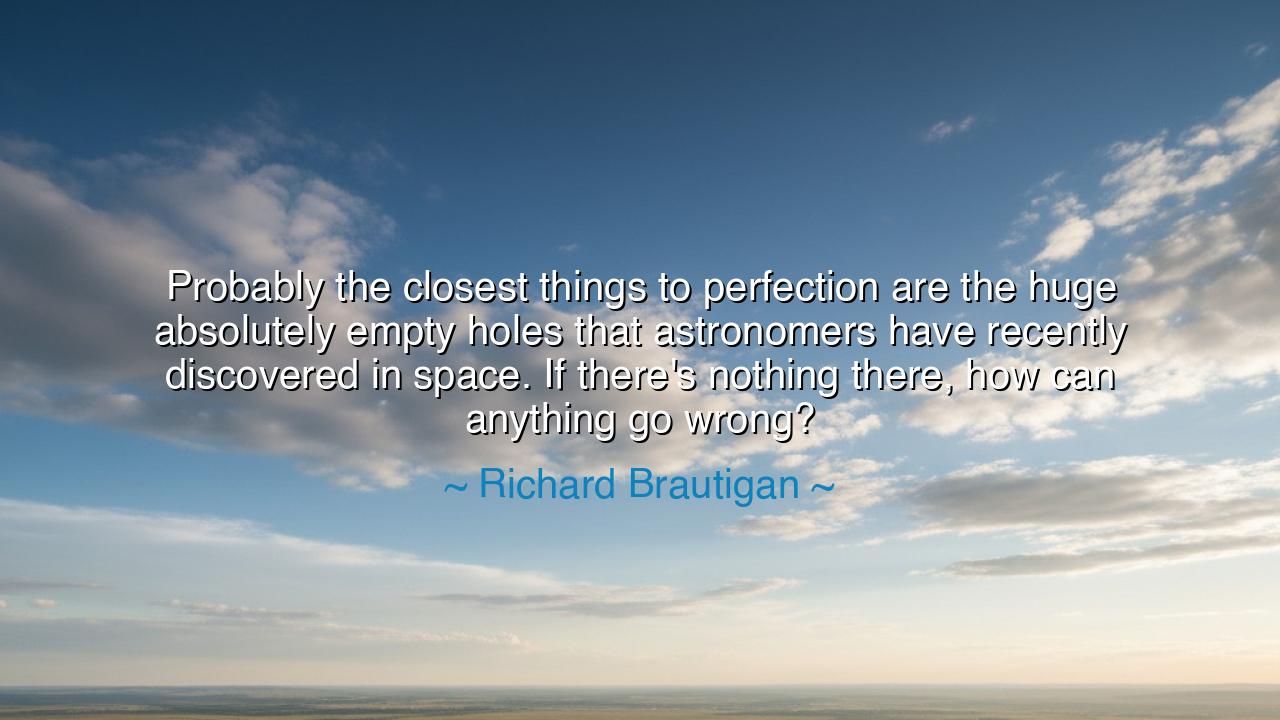
Probably the closest things to perfection are the huge absolutely
Probably the closest things to perfection are the huge absolutely empty holes that astronomers have recently discovered in space. If there's nothing there, how can anything go wrong?






"Probably the closest things to perfection are the huge absolutely empty holes that astronomers have recently discovered in space. If there's nothing there, how can anything go wrong?" These words, spoken by Richard Brautigan, offer us a playful yet profound meditation on the nature of perfection and emptiness. In the vastness of the cosmos, astronomers have uncovered what they call voids—massive, empty spaces devoid of matter, yet brimming with a certain kind of stillness. These emptinesses in space, which seem so devoid of purpose, may hold a deeper wisdom: the absence of all things can be the perfect state, free from conflict, free from the chaos that often defines human existence. Perfection, in this sense, is not found in the fullness of life, but in the absence of strife and imperfection.
In the ancient world, the philosophers often spoke of perfection in the same vein. The Greek philosophers, especially Aristotle, discussed the concept of the "unmoved mover", a being that was perfect because it was unaffected by the turmoil of the world. The heavens, in the eyes of ancient thinkers, were perfect—immutable, eternal, and untroubled by change. But for Aristotle, perfection was not found in the material world, where things were always in a state of flux. Instead, perfection existed in a state of stillness, a form of order and simplicity that existed beyond the chaos of daily life. Brautigan seems to echo this ancient view, suggesting that emptiness, rather than fullness, may be the key to peace and perfection.
Consider the example of Zen Buddhism, which also offers a path toward perfection that involves not the accumulation of knowledge, power, or possessions, but the emptying of the mind. The Zen masters taught that to attain enlightenment, one must clear the mind of distractions and find stillness in the void. Much like the voids in space, the empty spaces within the mind can be the most profound. In these spaces, free from the noise of everyday concerns, a deeper wisdom can arise—one that is not bound by the limitations of human desire or conflict. Brautigan’s concept of emptiness as a form of perfection reflects this very idea: perhaps true peace and harmony are found in the absence of everything we think we need, in the emptiness of the space where nothing goes wrong.
In the story of Siddhartha Gautama, the Buddha, we find a similar message. Siddhartha, in his search for enlightenment, first sought answers in the physical world—through wealth, luxury, and even extreme asceticism. But it was only when he sat in meditation, in the quiet and emptiness beneath the tree, that he found his truth. It was in the absence of all distractions, in the stillness of his own mind, that he reached a state of perfect peace. The message here is that it is not in the accumulation of knowledge, power, or wealth, but in the emptying of the mind and heart that true perfection is found. Just as the vast emptiness in space is free from error, so too can we be free from the chaos of our own desires by embracing a state of stillness.
But Brautigan’s quote also suggests that perfection is not about avoiding the inevitable problems and challenges of life, but about embracing the simplicity of being. The voids in space are not to be seen as mistakes, but as places of profound potential. In these vast emptinesses, new stars may be born, new galaxies may form. So too in our lives, moments of emptiness or stillness are not necessarily something to be feared. In the spaces between our desires, between our worries, between our conflicts, there may lie the fertile soil of creativity and growth. Perfection, then, is not the absence of change or challenge, but the ability to find peace and purpose in the face of life’s inevitable uncertainties.
The lesson for us, then, is clear: we must embrace emptiness in our lives. Just as astronomers discover beauty in the voids of space, so too must we seek to find meaning in the empty spaces of our own existence. These spaces—free from the clutter of distractions, desires, and conflict—can become the places where true creativity and peace arise. Rather than filling our lives with endless pursuits, we must learn to create room for stillness, to allow our minds the freedom to reflect, to grow, and to recreate ourselves in the absence of constant striving.
In practical terms, this means finding moments of silence amidst the noise of daily life. It means allowing ourselves to step back from the chaos and embrace moments of solitude, where we can simply be, without the need to fill every moment with activity. Whether through meditation, reflection, or simply taking time to step away from the busyness of life, we must create space—a void where our true selves can emerge. Just as the emptiness of space holds the potential for new stars and galaxies, so too can the emptiness in our lives become the space for personal growth and creative expression. By embracing the quiet, we find our way to a deeper, more meaningful existence.






AAdministratorAdministrator
Welcome, honored guests. Please leave a comment, we will respond soon